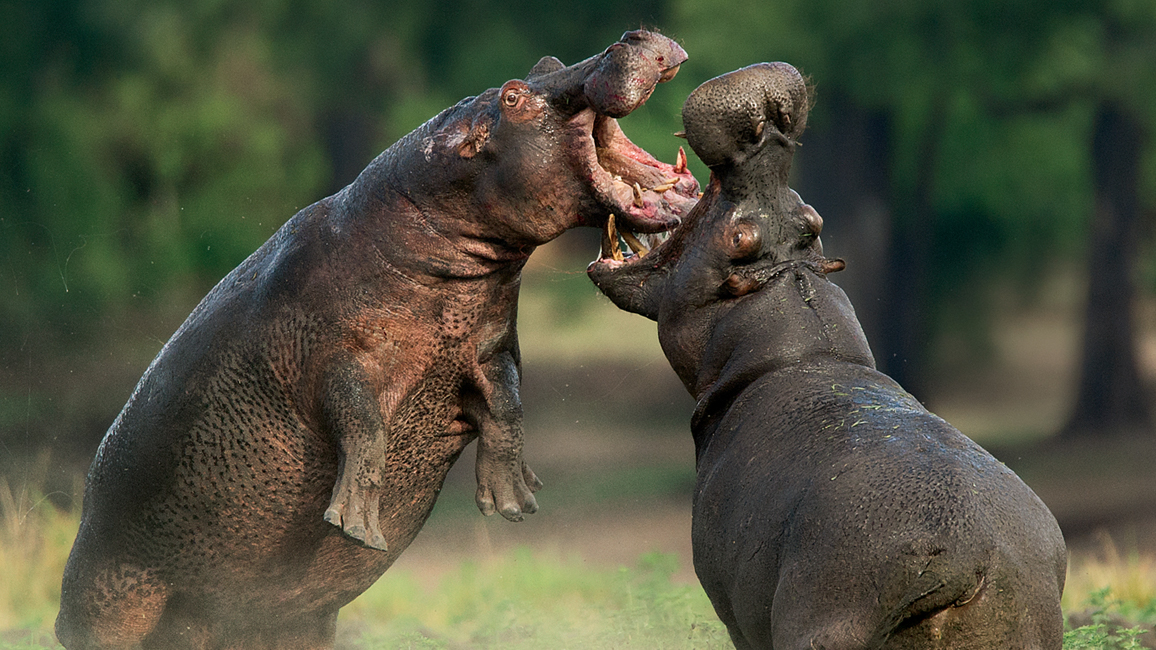
Big, Bad Hippos?
By Kathy KrankingHippos are usually peaceful and lazy. But they can be full of fight when they need to be!
Check out these hippos “mouthing off” at each other! In hippopotamus language, wide-open mouths mean business. They’re the hippos’ way of saying, “Back off, or you’ll be sorry!”
An angry hippo is one tough customer: These animals are strong and quick-tempered. They also don’t like intruders trespassing on their “turf.” A hippo resting peacefully one minute can be in full attack mode the next. And a hippo will attack anything it feels threatened by: crocodiles, other hippos, even people. With powerful jaws and banana length-or-longer teeth, a hippo is one of the most dangerous mammals in the world.
To learn more about hippos, keep reading—but keep your distance, just in case!
BEACH BUMS
Hippos can be bad tempered; that’s for sure. But they have another, more peaceful, side to their personalities, too.
The name hippopotamus means “water horse” or “river horse” in Greek. Hippos aren’t actually related to horses. Their closest living relatives are whales. But hippos do live up to the other part of their name: They really love water! In their hot, sunny African home, they’ll spend up to 18 hours a day chilling out in rivers or lakes.
Hippos are specially built for life in the water. Their eyes, ears, and nostrils are on the tops of their heads. That lets them get almost all the way under the water for maximum cooling, while still being able to see, hear, and breathe.
When they want to, though, hippos can go completely underwater. And they often do. A hippo will stroll along a lake or river bottom, looking for water plants to eat. Its toes are connected by webbing, which helps it push through the water. Special, clear eyelids act as built-in goggles to help it see. And its nostrils close up tightly to keep water from getting inside its nose. A hippo can stay underwater for about five minutes before it has to come up to take a breath.
NOISE MAKERS
Hippos hang out in herds of 10 to 30 members, though some herds can be bigger. A herd is made up of mostly adult females and their calves, but also some adult males. One of those males is the boss of the whole group. He protects the herd by attacking any intruders that trespass in his territory. That includes animals, people, or even boats!
Hippos aren’t quiet animals at all. Herd members “talk” to each other with all kinds of sounds, including bellows, snorts, honks, grumbles, squeaks, and clicks. They make these sounds both in the air and under the water. Some of the sounds are almost as loud as noise you’d hear at a rock concert!
MIDNIGHT SNACKERS
Though they spend all day in or near water, hippos head out as the sun begins to set. They leave the water and travel on land, looking for grass, their main food. To find their way to the best grazing areas, they follow “trail markers”—big piles of hippo droppings left by herd members.
Even though they’re big and roly-poly, hippos eat just a little more than one percent of their body weight in 24 hours. They really don’t need a lot of food, since they’re not very active most of the time. After a night of eating their fill of grass, herd members head back to the water to stay cool during the heat of the day.
The water keeps hippos from overheating. But it doesn’t protect their skin from the sun. So hippos have another way of protecting themselves: built-in sunscreen. Special glands in their skin ooze a covering that keeps them from getting sunburned. The ooze may also help wounds to heal.
SUPER MOMS
When a mother hippo is ready to give birth, she leaves the herd for a few weeks to be alone with her newborn. A hippo can give birth on land or in the water, and usually has just one baby. A newborn hippo looks tiny compared to its mother, but it’s 10 times bigger than a human baby.
A baby hippo drinks milk from its mother. But at about a month old, it starts grazing a bit, as well. The baby is able to swim, though it can’t hold its breath as long as an adult hippo can.
Mother hippos take good care of their babies, fearlessly protecting them from enemies such as crocodiles, lions, hyenas, and leopards. Young hippos often stay in the herd with their mother for years. But when they’re older, they may go off to find another herd to live with.
So now you know all about hippos—the good, the big-and-bad, and everything in between!
“Big, Bad Hippos?” originally appeared in the May 2015 issue of Ranger Rick magazine.
(Click on each image above for a closer view of the story.)



















